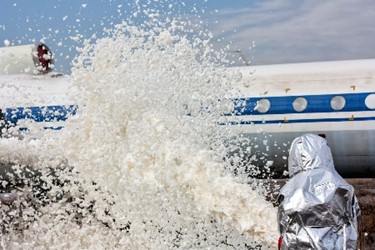CustoMem Changes Name To Puraffinity And Announces Successful Fundraise To Accelerate Its Growth

Trial to start at a major airport
Puraffinity, a spin-out from Imperial College London, that develops advanced materials for selectively removing target chemical compounds from water, has announced an oversubscribed seed round of $3.55M (£2.8M) from leading sustainability investors.
In conjunction, the company is rebranding and changing its name from “CustoMem” to “Puraffinity” to reflect the broad application of its technology to design an array of materials for purification by leveraging the power of chemical affinity principles.
The company is currently developing a range of adsorbent media materials, targeted at removing per- and polyfluoroalkyl substances (PFAS) from water. PFAS contamination has become a worldwide environmental challenge as stringent advisory limits are being imposed and conventional treatment processes, such as granular activated carbon and ion exchange, are not able to provide a robust and cost-effective solution.
“By successfully raising seed capital finance, we can accelerate our scale up and deploy our technology in global markets that are in immediate need of a solution to the PFAS problem,” said Puraffinity Chief Executive Officer Henrik Hagemann. “We are pinpointing our efforts at industries facing the most severe contamination problems, such as airports, military bases and chemical manufacturing. This stems in many cases from extensive use of firefighting foams and the infiltration of these into groundwater sources that now require treatment.”
Leading investor in the seed round is Kindred Capital, a London based early stage venture capital fund. Founding partner of Kindred, Leila Zegna is being appointed as investment director at Puraffinity. Other investors include HG Ventures, the corporate venture arm of The Heritage Group of Indianapolis USA who specialises in investing and partnering with companies developing advanced materials and sustainability tech companies, investiere.ch (Verve Capital Partners) of Switzerland and a number of prominent angel investors including former Microsoft Head of Corporate Strategy Charlie Songhurst & CEO of Entrepreneur First, Matt Clifford.
Trials with one of Europe’s busiest airports will be commencing in the autumn. In addition, the company is discussing collaborations and partnerships with several reputable players in the global water space, to accelerate go-to-market plans and meet an ambitious growth agenda.
“Trials to date show that we can provide a cost-effective and versatile solution. Our customised media product can be retrofitted into existing assets and higher affinity allows higher flow rates to be used. This reduces the need for extremely large tanks, thereby mitigating footprint constraint challenges,” explained Henrik Hagemann. “In addition, unlike others, our product is regenerable using an on-site simple and safe proprietary technique, which leads to longer operational lifecycles and a highly attractive return on investment for our clients.”
“We are delighted to have had the opportunity to invest in Puraffinity as we have been hugely impressed with the ambition, experience and innovative approach of their management team,” said Leila Zegna, founding partner of Kindred Capital. “We also see their new product as a pioneering development which leverages chemistry principles in an advanced way to provide a solution to a key environmental issue.”
HG Ventures will also be represented on Puraffinity’s board with Managing Director John Glushik joining as a board observer. For more information, visit https://www.puraffinity.com/
About Puraffinity
Puraffinity combines world leading expertise in bio-based materials, chemistry and water treatment to deliver high impact treatment solutions. We design and manufacture novel materials that specifically bind and remove micropollutants from wastewater. Our materials offer a simple, safe and cost-effective solution to tackle the most challenging micropollutants found in the industrial sector. We provide peace of mind to our customers by allowing them to meet regulations and fulfil their sustainability commitments.
About Kindred Capital
Kindred Capital is a seed and early stage venture capital investor, focusing on European technology companies. Based in London, Kindred invests in entrepreneurs building globally ambitious businesses. Kindred’s portfolio includes Kalo, Paddle, Five.ai, LabGenius and Verve. Kindred’s unique Equitable Venture model, of sharing carry with the founders they invest in, has led to over 60 founders co-owning carry in the fund. For more information, visit www.kindredcapital.vc
About PFAS
PFAS have been widely used on a global scale since the 1950s to make products across diverse industries, including firefighting foams, hydraulic fluids, stain resistant fabrics, packaged food containers, waterproof clothing, personal care products and cleaning products.
PFAS are commonly found in Aqueous Film Forming Foams (AFFF) as advanced fire-retardant technologies. AFFF are critical to health and safety operations of many high-risk environments including airports, military sites and firefighting training facilities.
The use and testing of AFFF causes PFAS contamination due to its infiltration routes into soil and groundwater and the chemical properties of PFAS make it highly mobile in water and resistant to degradation and oxidation. Airports and military sites are now facing a major challenge to control the discharge, limit further contamination of PFAS impacted soil and water and also to clean-up legacy contamination.
Studies on toxicity of PFAS in humans has suggested that they cause significant health impacts, such as reduced birth weight, developmental effects in bones, and increase the risk of certain types of cancer. Human exposure to PFAS is widespread and it has been found that most people living in developed countries will have some level of PFAS in their bodies.
The health threat posed by PFAS has prompted many countries to lay down more stringent regulations to the discharge of these compounds. This is evidenced by recent moves by both the EU via the Environmental Quality Standards Directive and in the US via the Environmental Protection Agency.
Source: Puraffinity
